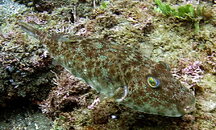...You could call it chasing, but I don't think there is anything wrong with something like this.
I agree with you. I think there is a difference between swimming & chasing. This didn't look like chasing to me. It looked like a diver doing a regular dive happening upon a school of fish & then slowly swimming with them. To be fair, it also looked like the diver was touching the bottom which I personally don't agree with.
There are two "interactions" in this video... the Greeny at 0:25 and the shark at 0:53 & 1:34. OK, I practically shoved my go pro down that Greeny's mouth, but the shark was incidental. I don't see the harm in any of it. I don't see a need to change my habits here...
I think it's up to the individual. I would say that the interaction with the eel (& your earlier note about picking up a queen conch to show the pink inside to others) seems a bit too intrusive for me personally. In regards to the sharks, this is one of the lines I struggle with...it seemed as if you came upon the sharks, shot video for a few seconds following them, they got agitated/swam away & then the interaction ended. I've done the same (albeit without video). Now, I'm not sure about the following aspect.
I had a fish that I need to ID sometime try to bite my fingertips off while I was trying to get a shot of a shrimp eating a sea star's leg. I tried to swat it away, but of course you can't touch them if they don't want you to. So: not thrilled, tried to hit back, did not succeed (nor did I expect to). I claim justifiable self-defence.
This is interesting. From your post & some others I recently read, I'm now starting to think that if a fish is attacking me, it means I am too close to its space. So this is probably a good thing to add to my list: I am too close if the animals are fleeing from me, hiding from me or
if they are attacking me. Thank you for making me think about this.
Anyone with the self-awareness to ask themselves that question is a net gain for the environment, IMO.
Aww, thank you! Made my day.

There are definitely some photographers and videographers touching and possibly damaging corals, reefs, marine life. However, I think they are the minority, not the majority. Showing the world the beauty of the underwater world can bring attention to the necessity of protecting it.
I think you are right when we talk about amateurs. I don't see many amateur photographers or videographers (who can dive) doing things that I wouldn't do myself in their position.
What I saw in Egypt, however, was something else. Evidently one reaches a level where "the shot" is SO important that anything getting in the way of that shot (like a bit of coral that needs to be snapped off because it's in the way) is secondary in nature. It's probably the same kind of mentality that leads to sporters "cheating".... getting results at any cost. This is what I saw this guy doing, and what I saw him teaching to his students..... You don't get to work for National Geographic by having exemplary diving skills and the video WAS amazing..... like REALLY amazing. That was his mission and the mission was accomplished...
I agree that showing everyone the beauty of the underwater world can convince people it's critical to protect it, but I have seem so many amateur photographers/videographers touching & damaging the reef that it makes me ill. And to know that the experts do the same is just disgusting! I understand that it's even harder to draw the line when it's your livelihood at stake, but crap like this shouldn't happen.




